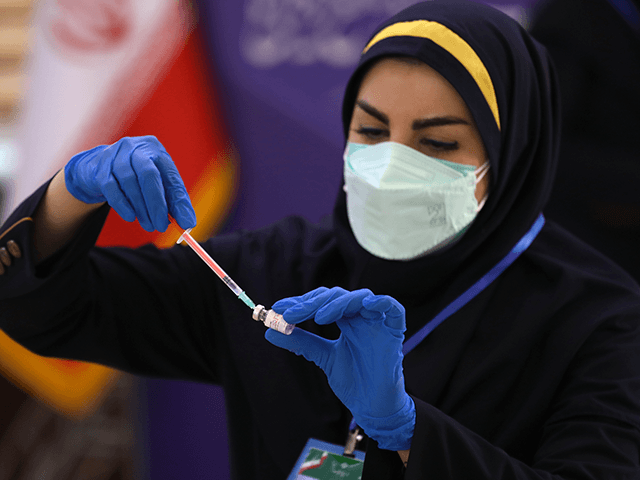Iran’s health ministry on Monday approved a domestically produced Chinese coronavirus vaccine candidate called “COVIran Barekat” for emergency use in the country, Iran’s state-run Press TV reported.
Iranian Health Minister Saeed Namaki announced COVIran Barekat’s emergency authorization at a press conference held at Arak University of Medical Sciences, located in the western Iranian city of Arak, on June 14.
“The permit for using the Pasteur vaccine [COVIran Barekat] will be issued next week, and in the near future, the Razi and Fakhra vaccines will be added to the list of usable [Iranian COVID] vaccines,” Namaki said at the press briefing, as quoted by Press TV.
Namaki referred to two additional Chinese coronavirus vaccine candidates that Iran claims to have developed in recent months.
PressTV alleged on Monday that Iran’s “Razi” coronavirus vaccine candidate may be administered “via inhalation.”
“The Razi vaccine, officially known as Razi COV-Pars, is Iran’s second homegrown vaccine and a product of the Razi Vaccine and Serum Research Institute, which is administered via injection and inhalation,” the state-owned news outlet wrote.
“Fakhra, the third Iranian vaccine, is developed by the Iranian Defense Ministry’s research center, formerly headed by nuclear scientist, Mohsen Fakhrizadeh, who was assassinated in a suspected Israeli-linked terror attack late last year,” according to Press TV.
Namaki made outlandish claims about Iran’s coronavirus vaccine candidates during Monday’s press conference in Arak, including the following proclamation: “I proudly announce that Iranian vaccines enjoy the lowest rate of side effects and are the most effective and safest vaccines in the world.”
Iran’s health minister did not provide any evidence to support this statement. He similarly failed to acknowledge the fact that he was announcing an emergency authorization for a vaccine candidate at the time, meaning the supposed “inoculation” has yet to complete late-stage clinical trials designed to determine its safety and efficacy rates.
Iran has suffered from one of the world’s worst coronavirus outbreaks and, according to the accounts of Iranian political dissidents, has largely failed to contain its epidemic. The Islamic Republic was one of the first countries outside China to detect cases of the Chinese coronavirus in early 2020, which observers attribute to Tehran’s close ties to Beijing.
“Iran’s case is curious because it is isolated due to economic and political sanctions but was still hit by the pandemic … Thereby, meaning that it is not so isolated as it is thought to be,” Manjari Singh, a scholar from the Middle East Institute in New Delhi, told the Epoch Times last spring.
Singh noted Iran’s first Chinese coronavirus outbreak took place in the city of Qom, which is an Islamic pilgrimage site where “most of the Chinese [Belt and Road Initiative (BRI)] projects are set up. So the Chinese link is there.”
Tehran is a member of Beijing’s infrastructure-building BRI and maintained trade ties with China during the outbreak of the Chinese coronavirus pandemic to the detriment of Iran’s public health.

COMMENTS
Please let us know if you're having issues with commenting.